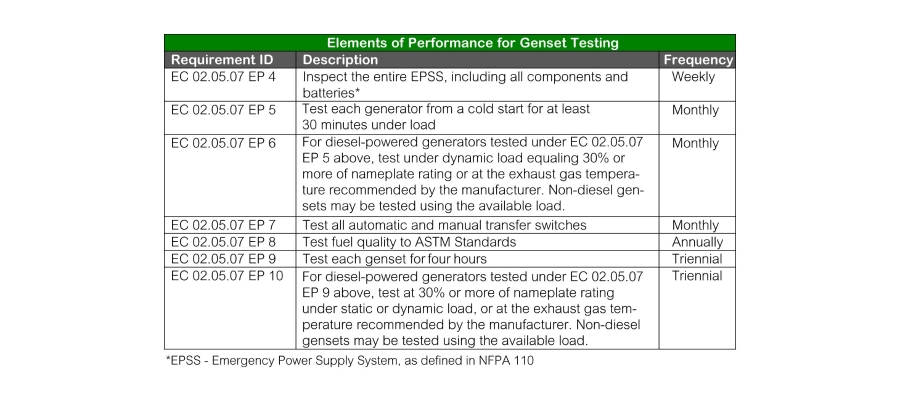The Joint Commission is a not-for-profit organization that evaluates healthcare organizations and programs in the United States. To promote safe and effective care, it issues standards that are used to audit and accredit healthcare practices and facilities.
To obtain and maintain accreditation, the Joint Commission and its authorized agents audit hospitals against its guidance, including guidance for the management and testing of backup power systems. Poor audit performance, including audits of power testing records, can lead to loss of accreditation. Payors may require accreditation as a condition of payment for patient services. This is one reason why it is important to perform the necessary testing and document its results.
Organization of Joint Commission Standards
The Joint Commission’s Hospital Accreditation Standards set forth criteria for the management and testing of emergency power systems together with an underlying rationale. Each criterium is followed by Elements of Performance that can be audited to demonstrate compliance with that criterium, which must be done to obtain or maintain Joint Commission accreditation. Many Elements of Performance direct users to requirements outlined in the NFPA standards for additional information. Actions required to comply with Joint Commission standards are similar to those required to comply with the NFPA standards.
For example, criteria affecting backup power systems are presented in the second section of the Standards, entitled Environment of Care. There, Standard EC.02.05.07 states, “The hospital inspects, tests, and maintains emergency power systems.” Thereafter, a paragraph describing the rationale for this standard is presented, which states that power disruptions could leave a hospital unable to deliver safe care and services and thus should be tested regularly to detect problems and reduce risks. The Standard then describes Elements of Performance that can provide evidence as to whether a criterium is satisfied, such as whether testing has been conducted at the specified frequencies and amounts of load.
Elements of Performance for Genset Testing
The primary Elements of Performance for backup power system testing are found in EC.02.05.07. The relevant provisions are summarized as follows.
To obtain and maintain accreditation, the Joint Commission and its authorized agents audit hospitals against its guidance, including guidance for the management and testing of backup power systems. Poor audit performance, including audits of power testing records, can lead to loss of accreditation. Payors may require accreditation as a condition of payment for patient services. This is one reason why it is important to perform the necessary testing and document its results.
Organization of Joint Commission Standards
The Joint Commission’s Hospital Accreditation Standards set forth criteria for the management and testing of emergency power systems together with an underlying rationale. Each criterium is followed by Elements of Performance that can be audited to demonstrate compliance with that criterium, which must be done to obtain or maintain Joint Commission accreditation. Many Elements of Performance direct users to requirements outlined in the NFPA standards for additional information. Actions required to comply with Joint Commission standards are similar to those required to comply with the NFPA standards.
For example, criteria affecting backup power systems are presented in the second section of the Standards, entitled Environment of Care. There, Standard EC.02.05.07 states, “The hospital inspects, tests, and maintains emergency power systems.” Thereafter, a paragraph describing the rationale for this standard is presented, which states that power disruptions could leave a hospital unable to deliver safe care and services and thus should be tested regularly to detect problems and reduce risks. The Standard then describes Elements of Performance that can provide evidence as to whether a criterium is satisfied, such as whether testing has been conducted at the specified frequencies and amounts of load.
Elements of Performance for Genset Testing
The primary Elements of Performance for backup power system testing are found in EC.02.05.07. The relevant provisions are summarized as follows.



